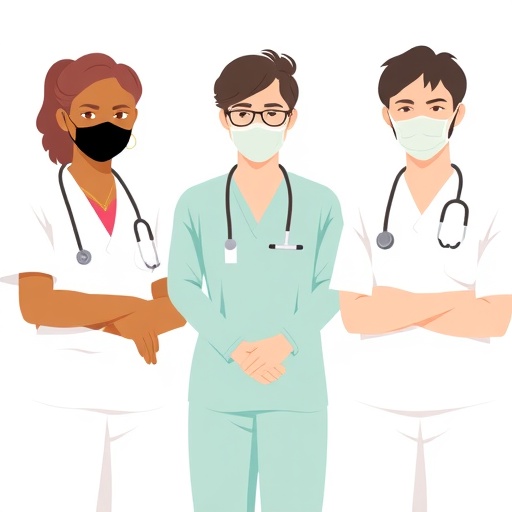In the high-stakes environment of public health emergencies, the psychological well-being of medical personnel has emerged as a critical focus in contemporary research. A recent study published in BMC Psychology has shed light on the complex interplay between perceived stress, resilience, and self-efficacy among healthcare workers combating crises such as pandemics, natural disasters, and other large-scale health threats. This pioneering work uncovers how beliefs in one’s own capabilities—termed self-efficacy—mediate the relationship between the stress medical staff perceive and their capacity to recover and adapt, known as resilience.
Medical practitioners are routinely subjected to extraordinary pressures in emergent health situations, facing long hours, unpredictable scenarios, and significant emotional strain. The central inquiry explored by the researchers was how perceived stress, which encompasses an individual’s subjective assessment of stress exposure and its impact, correlates with resilience, the psychological robustness enabling individuals to bounce back from adversity. Traditional understanding posits that high stress impairs resilience; however, this study introduces a nuanced perspective by focusing on self-efficacy as a critical psychological resource.
Self-efficacy, a construct rooted in Bandura’s social cognitive theory, represents an individual’s confidence in their ability to execute behaviors necessary to achieve specific performance attainments. It influences the way people think, feel, and motivate themselves under pressure. By examining medical staff during public health crises, the authors provide evidence that self-efficacy serves as a mediating factor that can buffer the deleterious effects of perceived stress on resilience. Essentially, those with higher self-efficacy demonstrate stronger resilience despite experiencing elevated stress levels.
Methodologically, the study utilized robust psychometric assessments administered to a significant cohort of frontline healthcare workers during active public health emergencies. These instruments quantified perceived stress through well-validated scales, measured resilience via standardized psychological inventories, and evaluated self-efficacy using domain-specific questionnaires tailored to healthcare settings. The large sample size and real-time data collection during emergency conditions lend credibility and practical relevance to the findings.
One of the groundbreaking outcomes of this research is the delineation of self-efficacy’s mediating pathway. Statistical analyses revealed that perceived stress negatively impacts self-efficacy, which in turn affects resilience. This mediation model unpacks the underlying mechanism by which the psychological burden of frontline duties translates into resilience outcomes. Importantly, interventions enhancing self-efficacy could disrupt this chain, mitigating stress impact and fostering psychological recovery.
The implications are profound for healthcare organizations and policymakers. Training programs emphasizing skills mastery, problem-solving, and coping strategies could bolster self-efficacy among medical personnel. Enhancing such psychological resources may not only improve mental health outcomes but also indirectly improve patient care quality through sustained worker performance and reduced burnout. The study advocates integrating psychological resilience-building curricula into emergency preparedness protocols.
Beyond individual-level interventions, the research underlines the need for systemic changes in healthcare infrastructure during crises. Organizational support, clear communication channels, and resource availability directly influence staff perceptions of control and efficacy. Cultivating an environment where healthcare workers feel competent and supported is as vital as psychological training because it collectively strengthens resilience across the workforce.
Furthermore, this investigation opens up new avenues to explore how digital platforms and technology-assisted interventions could be harnessed to enhance self-efficacy remotely. Virtual reality training, gamified simulations, and AI-driven personalized coaching could provide scalable solutions to boost confidence and skill mastery under stressful conditions. This technological integration stands poised to transform mental health support in public health emergencies.
The cross-sectional data also suggest a bidirectional relationship where resilience might foster higher self-efficacy over time, creating a virtuous cycle of psychological fortitude. Longitudinal studies are anticipated to validate these dynamics, potentially guiding continuous support systems tailored to changing stress and efficacy levels throughout and after emergency shifts.
Crucially, the study highlights that perceived stress is inherently subjective and modifiable. Differing cognitive appraisals of the same external stressors imply that psychological reframing could reduce stress perception. Cognitive-behavioral approaches aimed at altering maladaptive thought patterns and reinforcing self-efficacy beliefs could serve as effective adjuncts in resilience-enhancement strategies.
The global relevance of these insights cannot be overstated given the recurrent nature of public health emergencies worldwide. Whether confronting infectious disease outbreaks, mass casualty events, or environmental catastrophes, healthcare providers face similar psychosocial challenges. Implementing evidence-based psychological frameworks such as those identified in this study will be essential to maintain an effective emergency response workforce.
Finally, the publication’s timing is particularly significant given the COVID-19 pandemic’s unprecedented impact on healthcare systems globally. The frontline experiences of medical staff during such crises have underscored vulnerabilities but also resilience capacities that the current research elucidates at a psychological level. As the world prepares for future threats, understanding the mediating role of self-efficacy offers a promising path to safeguarding the mental health of those who safeguard public health.
In conclusion, this innovative study not only refines the theoretical understanding of stress and resilience interplay but also provides actionable insights for enhancing psychological endurance in medical professionals. By centering self-efficacy as a modifiable mediator, it paves the way for targeted interventions that could revolutionize mental health support during times when it is most desperately needed. The findings demand attention from psychologists, healthcare leaders, and emergency planners alike, highlighting a critical dimension of preparedness that extends beyond physical resources and into the realm of human psychological capital.
Subject of Research: Psychological resilience, perceived stress, and self-efficacy among medical staff during public health emergencies.
Article Title: The association between perceived stress and resilience among medical staff during public health emergencies: mediating effect of self-efficacy.
Article References:
Chen, H., Cao, Z., Zhang, X. et al. The association between perceived stress and resilience among medical staff during public health emergencies: mediating effect of self-efficacy. BMC Psychol 13, 1167 (2025). https://doi.org/10.1186/s40359-025-03496-0
Image Credits: AI Generated




